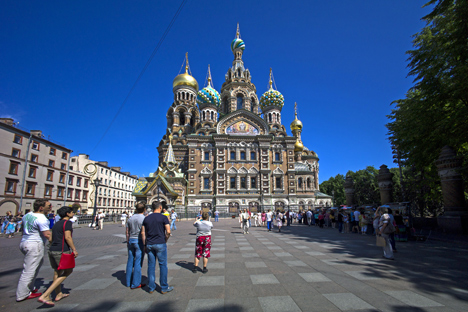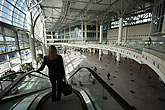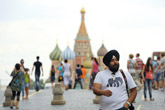Perception issues deter western tourists from travel to Russia

In early May, Russia rose by 18 points from 63th to 45th place in the prestigious international Travel & Tourism Competitiveness Report rankings. Source: Ullstein Bild/Vostock Photo
When Laura Powell, a travel reporter for CNN.com asked, “Is now the time to visit Russia?” in a January article she wrote, the question appeared absurd, given how tense relations were between Russia and most Western nations, including the United States. Ties were at post-Cold War lows and fighting was raging in eastern Ukraine.
The idea of Russia as a tourist destination, however, did gain more traction around then, primarily because of the ruble’s decline in value against western currencies like the euro and the dollar.
Data from Russia’s Federal Tourism Agency (Rosturism), confirms that there was indeed an increase in the number of tourists visiting Russia in December, soon after the ruble’s sharp fall. That was not enough, however, to show improvement in overall numbers for that year. Data from 2014 indicates that the number of tourists to Russia in 2014 declined by 3 per cent.
Nevertheless, the trend from December 2014 has continued into this year. Since the beginning of 2015, tourism into Russia has increased by between 3 and 5 percent, according to an interview Nikolai Korolev, Rostourism deputy chairman, gave to news agency TASS.
Western tourists are not, however, gradually returning to Russia. Tourists from the East are bridging the gap.
The number of tourists coming from China saw a 10 percent rise in the first quarter of 2015. While most tourists come to Moscow, the number of Chinese visitors to Siberia has also increased, said Anatoly Kazakevich, director of the travel agency Baikal, which focuses on trips to the eponymous lake.
“This is due to the currency exchange rate and the strengthening of international relations with Asia,” Kazakevich said.
Over the past year, Russia’s economic and political strategies have focused on the “pivot to Asia,” with major deals being signed between Gazprom and China’s national energy firm CNPC. Russian President Vladimir Putin also made a state visit to China last year.
Traditionally, Germany led countries in sending tourists to Russia. In 2013, around 380,000 Germans visited Russia. But in 2014, the number came down to 350,000 Germans, while the number of Chinese rose to 410,000; up from 372,000 in 2013.
The number of American tourists in 2014 also fell to 162,000, down from 197,000 the previous year, Rostourism figures show.
The value of a weak ruble
Vladimir Kantorovich, a member of the presidium of the Association of Tour Operators of Russia (ATOR), said that right now the weak ruble is the only trump card in Russian tourism, and that advantage, is offset by the overall negative attitude of the EU and the United States toward Russia.
“Clearly, it is not directly related to tourism, but tourists want to travel to those countries that have good relations with theirs,” Kantorovich said.
Tour operators agree with this statement: “Unfortunately, the depreciation of the ruble coincided with the deterioration of the image of Russia in the foreign market, therefore, the country failed to become more attractive to many foreign tourists,” said Alexander Lanskaya, executive director of Patriarshy Dom Tours, a travel agency specializing in sightseeing tours of Moscow, St. Petersburg and other Russian cities for foreign tourists.
Signs of improvement?
The recent downturn in tourism has only reinforced the recognition that despite its rich cultural heritage, Russia needs to promote itself better as a tourist destination. This year, Rostourism opened its first offices abroad, beginning with an office in Dubai in May. By September, the agency plans to have outlets in Finland, Germany, China and Italy.
Other government agencies are also working to improve Russia’s attractiveness for tourists. English signs and maps were introduced in the Moscow Metro last year, and in July 2014, Russia’s Interior Ministry created a division of police to help tourists.
However, ATOT’s Kantorovich noted that tourists still complain that metro workers and other municipal staff don’t speak English. And the tourist police have had a hard time recruiting qualified personnel.
Nevertheless, the initiatives may be paying off. In early May, Russia rose by 18 points from 63th to 45th place in the prestigious international Travel & Tourism Competitiveness Report rankings, prepared by the World Economic Forum and Strategy Partners Group.
Russia received high marks for cultural attractions, but low scores the difficulty of obtaining visas.
Getting a Russian visa is associated with a high degree of bureaucracy, says the ATOR’s Kantorovich, who believes that Russia could make concessions there: “No one prevents us from taking this step unilaterally and abolish visas,” Kantorovich said, citing the example of mutual abolition of visas with Israel. After the move, the flow of Israeli tourists to Russia increased by 50 percent.
All rights reserved by Rossiyskaya Gazeta.
Subscribe
to our newsletter!
Get the week's best stories straight to your inbox

